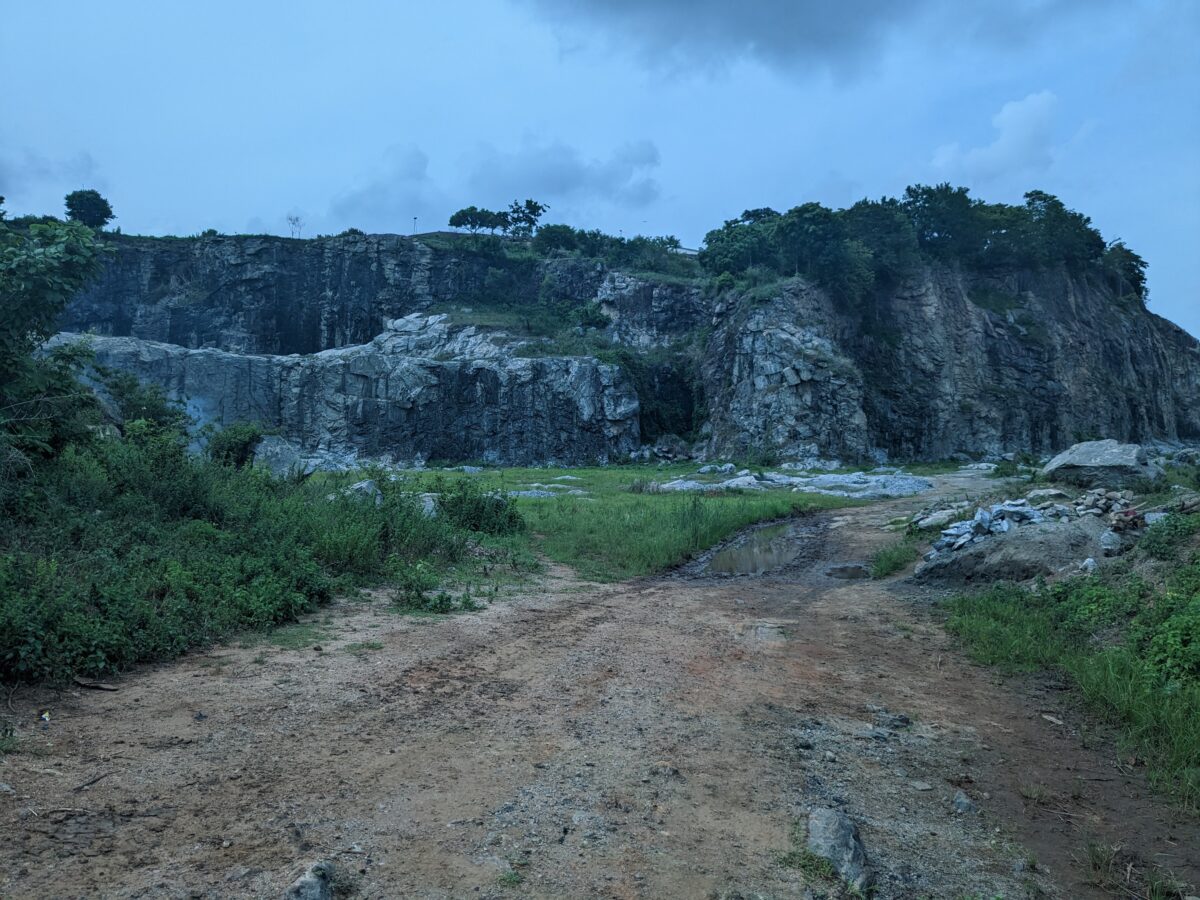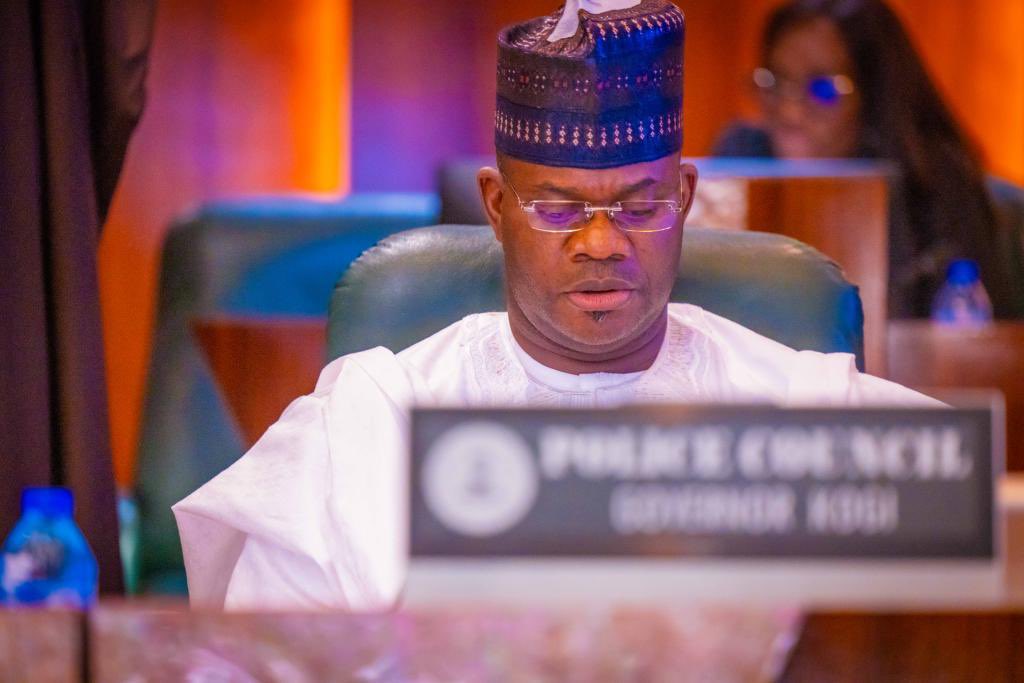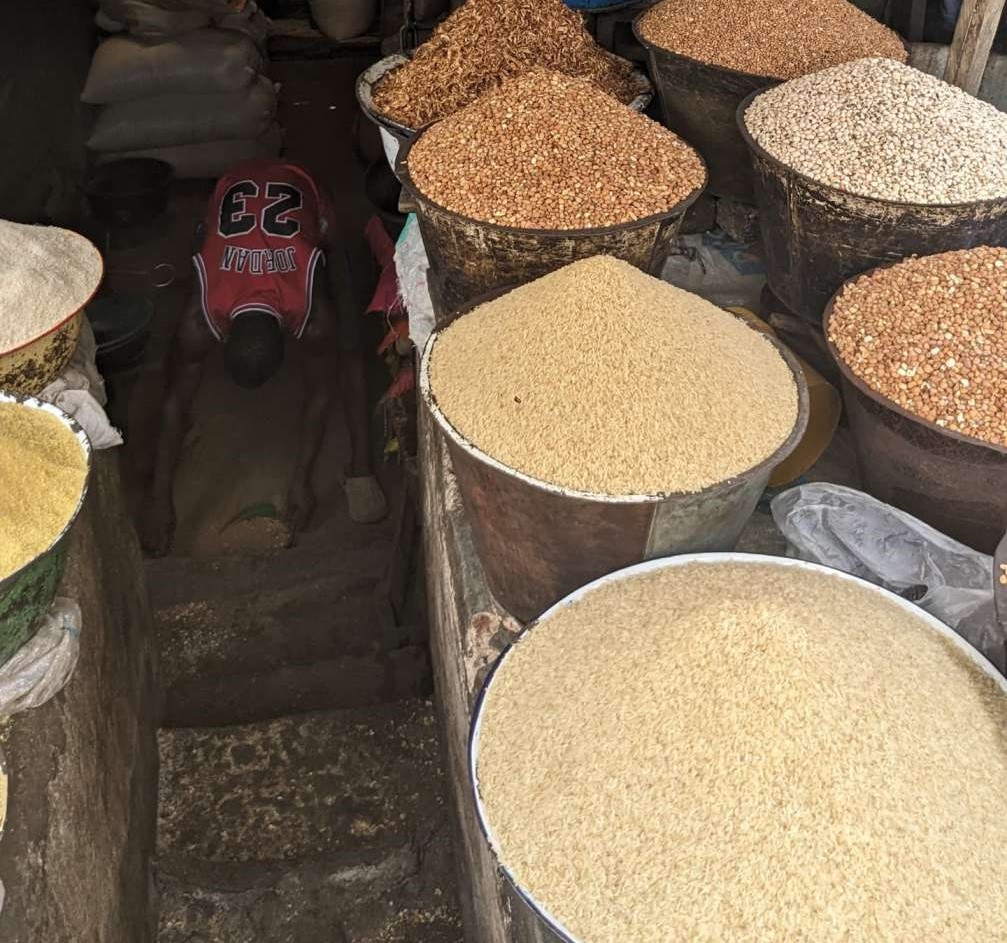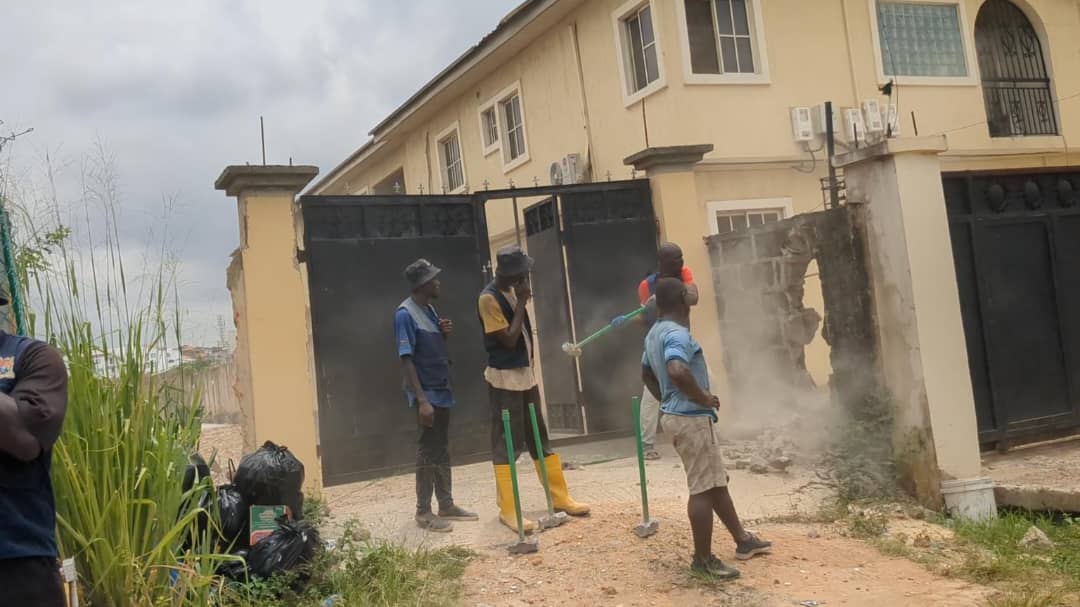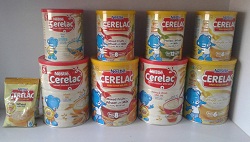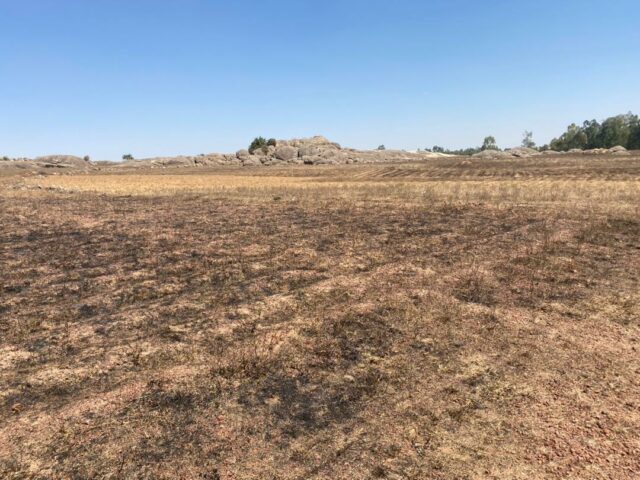‘Pam! Pam! Pam!’ A wooden hammer with a black rubber head made a rhythmic noise in the distance. White smoke rose into the air, evaporating as it kissed the atmosphere, soft billows of a congregation praying out their hearts from the hills added to the symphony, and then the buzz of machines and vehicles from within and across the expressway. Everything faded into the Old Adisa Quarrying Site and the International Gemstone Market in Ibadan.
The federal government commissioned the first international gemstone market in Oyo State on May 4. It is the first of its kind, as it is open to merchants from the rest of West Africa. The market is to track mineral resources mined from Nigeria and also provide the government revenue from the minerals.
A SEARCH FOR GEMS
When I arrived the Ojo bus terminal, Ibadan, around noon, I did not know how tough finding the International Gemstone Market could be. I knew I was on an adventure after I asked two drivers who spoke Yoruba about descriptions to the market. One of them, an elderly man past mid-age and with yellow dentition stained from years of tobacco, sized up my frame and gave the what-you-are-asking-is-a-hard-thing look before saying “you are asking to travel”.
“The place you are asking for is in Saki, Oke-Ogun,” he said. “You will have to walk straight down.” He pointed towards the exit of the terminal leading upward the Old Oyo road. “When you get there, look for a big mosque and ask for directions on how to get to Ofiki.”
“I know there is a gemstone market in Ibadan, and I also understand that precious stones brought into the city are offloaded at the garage where you get a bus to Ofiki, but you will get clarity when you get to the village.”
I wasn’t ready to believe Ofiki hosts the market I was looking for, as my preliminary research had revealed that the market was just by the Ojo bus terminal, so I asked other people. Two women who sold frozen foods and fruits told me they’d never heard of the sale of precious stones in their city, or a new gemstone market. The sixth person I asked, another driver who was next to his yellow and wine Micra car gave clarity but with a little confusing detail: “Go to the big mosque you can see ahead. Walk behind it. When you get there, you will see a garage. Ask to get a bus to Strabarg where stones are being mined.”
Armed with the two descriptions, I knew there was something about the big cream colour mosque that would provide answers to my quest.
“The place you are asking for is Strabarg,” a young Hausa man with a sprinkle of Yoruba told me after I arrived at the big mosque and asked for directions on how to get to the gemstone market. “And this is Strabarg, but you will need to return the way you’ve come to locate the market.”
I noticed the population of the Hausas and foreigners milling around the Old Oyo road. I asked one more person who confirmed that I needed to return the way I had come. This I did for more than an hour, walking up and down and round about Strabarg with no one willing to disclose the exact location of the market.
I would later find out that the precious stones market was behind the express road I had walked past several times, and that because of the discreetness involved in mining, traders refrain from talking about the market.
READ ALSO: REPORTER’S DIARY: Mature Mangoes Seek Attention in Osun LGA, But No One ‘Sees’ Them
I made little headway after I made inquiries from some men who, unknown to me, were miners. “Why do you want to go there?” They asked.
“I want to buy stones,” I responded.
“Do you know stones? What stone do you want to buy?”
“Yes, I know stones, and I know the kind I want to buy.”
The men exchanged shocking looks before one of them said, “Young lady, you will go ahead and buy fake. They will dupe you out of your hard-earned money. Tell me what you want to buy and I will help you.”
“I know what I want to buy. Just show me the way,” I insisted.
“Walk down the narrow path and you will find the market,” they said.
On either sides of the tiny path leading to the market stood old buildings built into one another. I walked on and on, even into a tiny hamlet cut off from the civilization across the road, yet no trader put stones up for sale. And then I started seeing pieces of what I would later know as tourmaline and rose quartz on display. A few small buildings with the inscription ‘Miners Association’ showed I was perhaps in the right place, but beyond those, no other thing indicated I was in Strabarg.
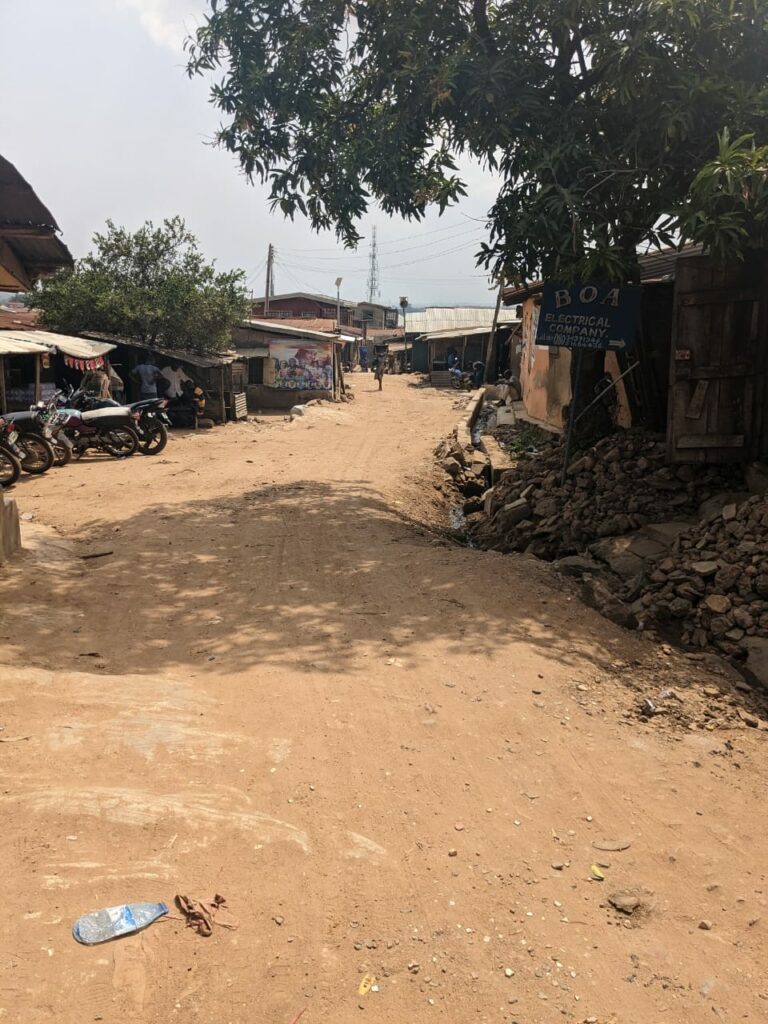
Meanwhile, in my earlier wanderings someone had mentioned that the only international market he knew was commissioned recently was at the Old Adisa Quarry in Akinyele, Ojo. Seeing that my search at Strabarg was futile, I headed to Ojo hoping for a shine of good fortune.
I would later find out that the commissioned gemstone market was in the same place as the Old Adisa quarrying site. The site was nearly deserted when I arrived, and the market was under lock. I needed proof that it was the recently commissioned market.
A NEW MARKET UNDER LOCK
The next morning, I was back at Old Adisa to visit the International Gemstone Market which sprawled on the left of the quarrying site with its yellow buildings and fence. A concrete fence demarcated it from the rest of the site, and its huge black gate spotted the banner used to announce its commissioning.
When I arrived there at 10:10 am, this time with an indigene of the town, who asked that we pose as undergraduates, the padlock of the gate was firmly shut.
We tried to go around the building to see if we could find anyone. Just as we were about to quit and venture into the quarrying site to see if we would see anyone, Timothy, a stoic-built young man appeared through the black gate.
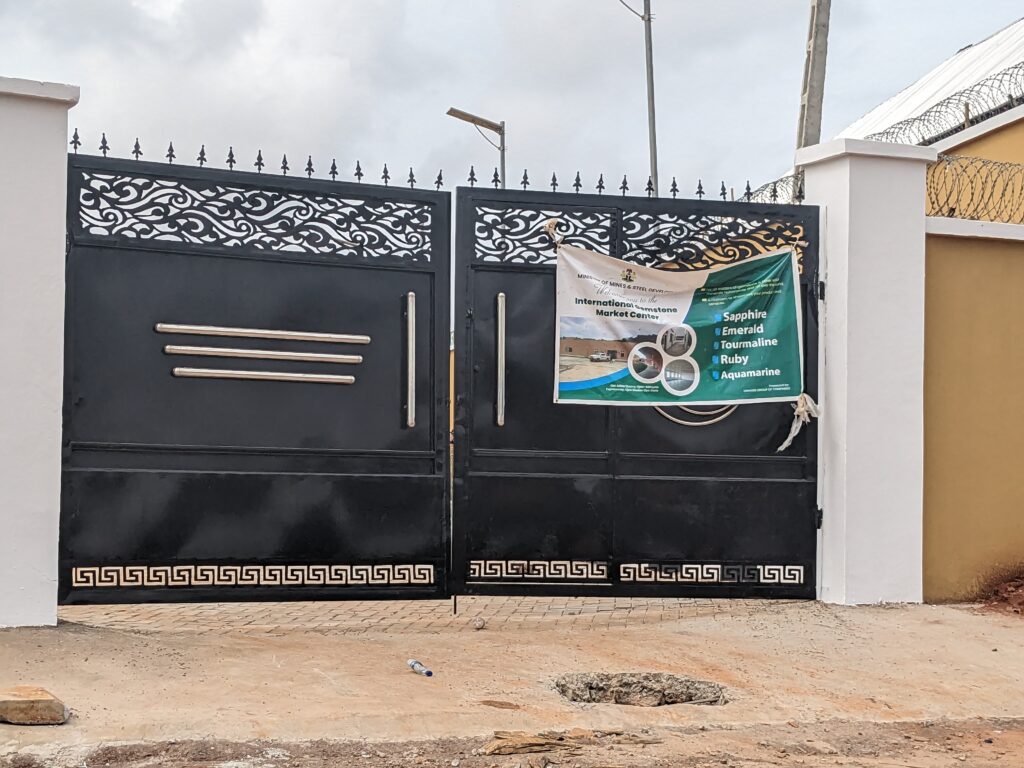
“Yes, what are you looking for?” He asked.
“We are aware the International Gemstone Market was opened recently, and we have come to trade,” I answered.
“The market was only commissioned; it has not been opened to the public.”
“When will it be opened?” I asked.
“I can’t say, but I know it won’t be opening anytime soon. If I say next week, it might not happen. It could be anytime. Maybe next week, or even next month. This place was only commissioned. Nothing is going on behind the walls. No trading or activity,” he told FIJ.
BREAKING GRANITE
We left the entrance of the new market for the quarrying site, and we saw smoke rising from among the rocks. We followed the smoke until we met Taye, a local who was blasting a huge rock partly engulfed in smoke with several pieces of firewood under it.
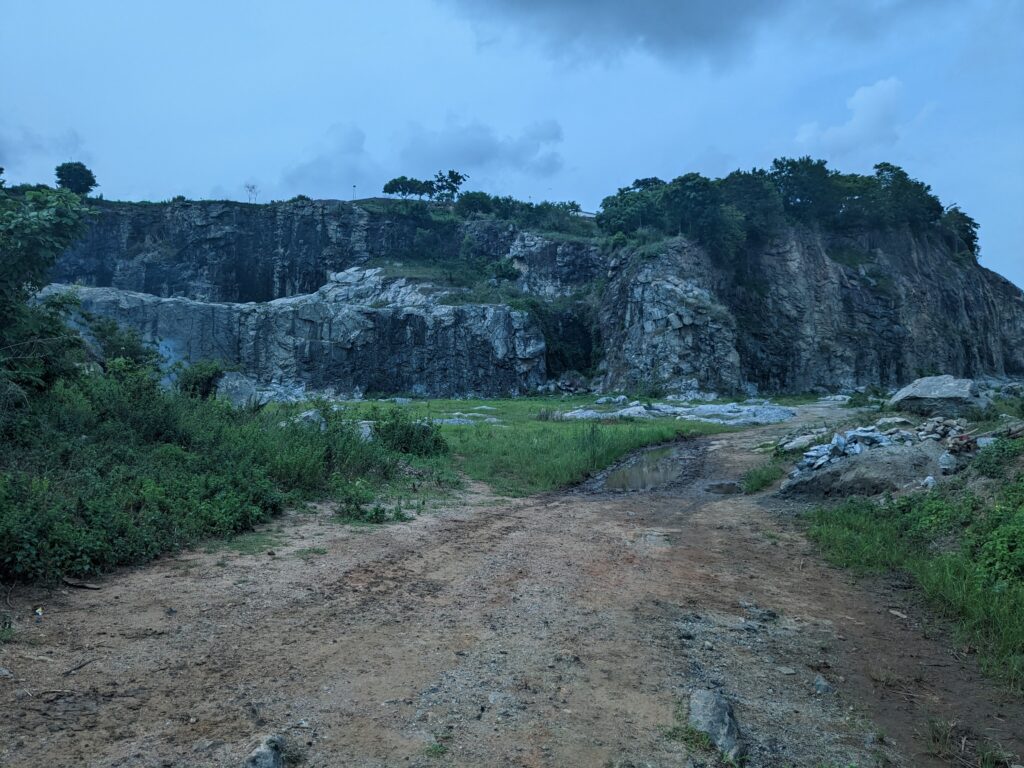
“We set fire under the rock to break it,” he told this reporter. “The intense heat from the fire breaks up the rock. It is what we used to break all the pieces you’re seeing here. That is how these hills are carved.”
Taye, motioning towards the rock, said, it takes only a few days to get the job done before proceeding to hammering.
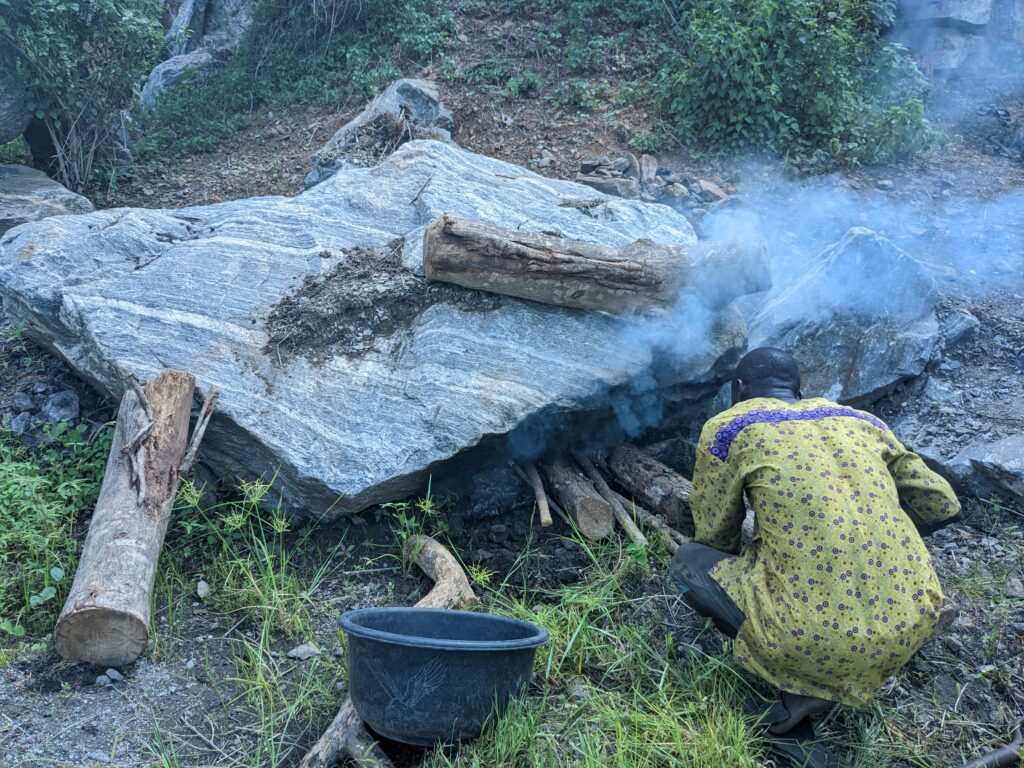
“It takes 2-3 days to break the rock. However, it begins to crack after about two hours of intense heat. It is after this is done that we proceed to breaking it into pieces with a hammer.
“From this site, we mine both granite and hardcore, which are commonly used for building houses and roads.”
When we asked how they sell and who they sell them to, Seyi said, “We sell to truck owners for N25,000. But we don’t get the money because this place is a company managed by its owners. We only receive whatever they give us.”
From where we stood talking to Taye, the soft thuds of Mama Pofu’s hammer filtered into our ears as she broke already blasted granite into smaller pieces.
Pam! Pam! Pam! Went her soft thud.
Though her work was clearly taking a toll on her, her spirit was cheerful when we greeted her. As she paused from talking to us, she kneaded her right thumb which was wrapped in a navy-blue piece clothing. She told us she got the pain from continuous rock breaking.
“I work this hard so my children can be better off. The work is stressful, but I need to earn a living,” she said.
“I get to break rocks like this after they have been blasted into pieces. I then use my wooden hammer to break them into smaller pieces for sale,” she told FIJ just before we left the quarry.
‘OIL IS FOR THE GOVT, MINING IS FOR THE PEOPLE’
After we left the quarrying site, we went to one of the places I had seen Rose Quartz on display the previous day. There, we met Chief Adamansigba, chairman of the miners’ association in the Ojo area.
He told FIJ that Nigeria is blessed with the rarest of precious stones one can find anywhere in the world but the government’s over-reliance on petroleum has diverted attention away from the booming industry.
“Ideally, there should be no poor person in Nigeria because of the abundant precious stones God has blessed our country with. There is no town without precious stones to mine,” he said.
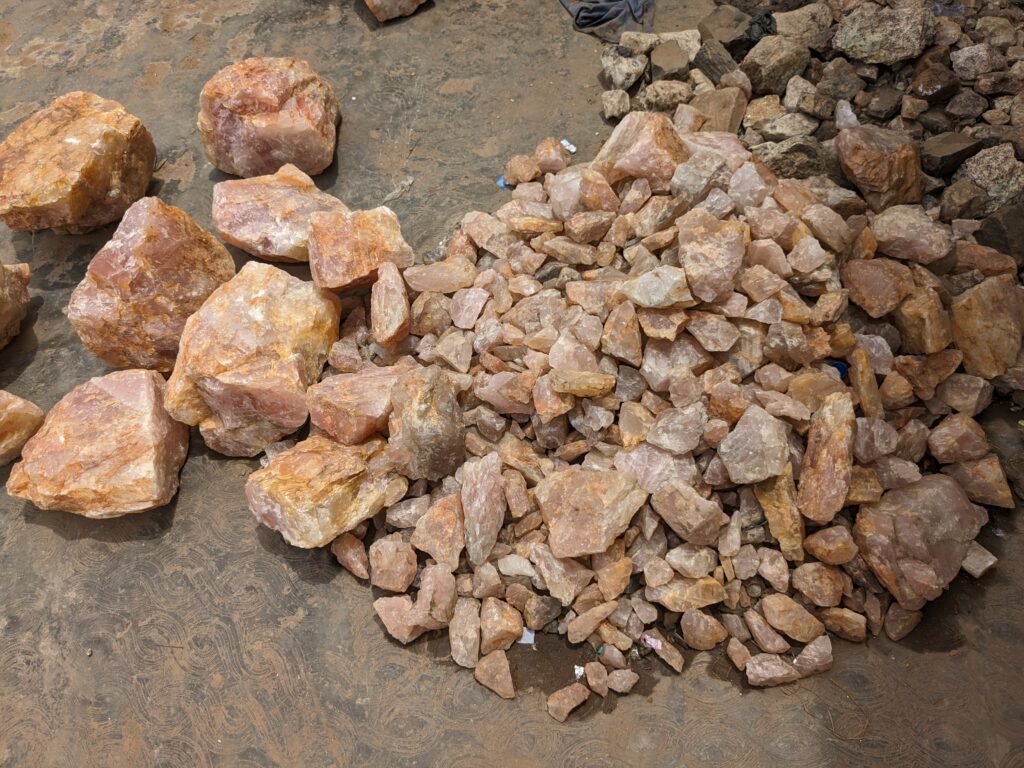
“There are mining sites across the southwest, from Oyo down to Kwara State. There are so many industrial minerals in Nigeria that we can count about 280 precious stones.
“When people go to excavate precious stones from a site, they spend lots of money only on feeding. But the excavations shouldn’t be done by individuals. It should be the responsibility of the government.
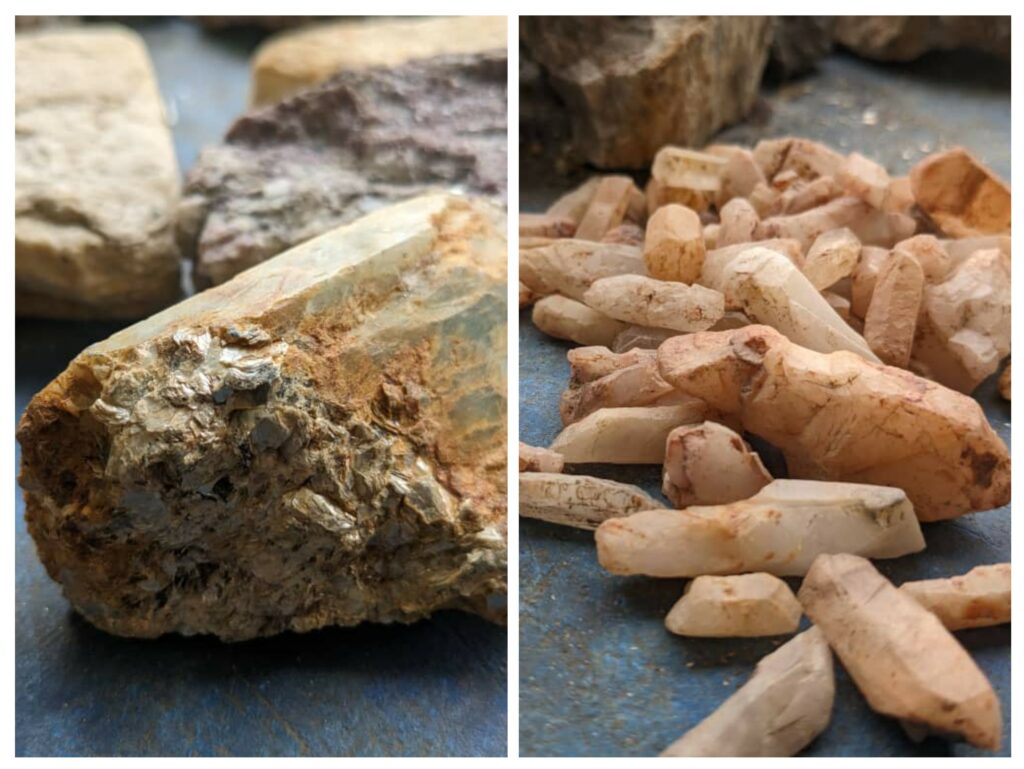
“Mining requires lots of investments which should ordinarily come from the government. But the government have focused solely on oil and left few individuals who can afford the cost to solely benefit from mining.
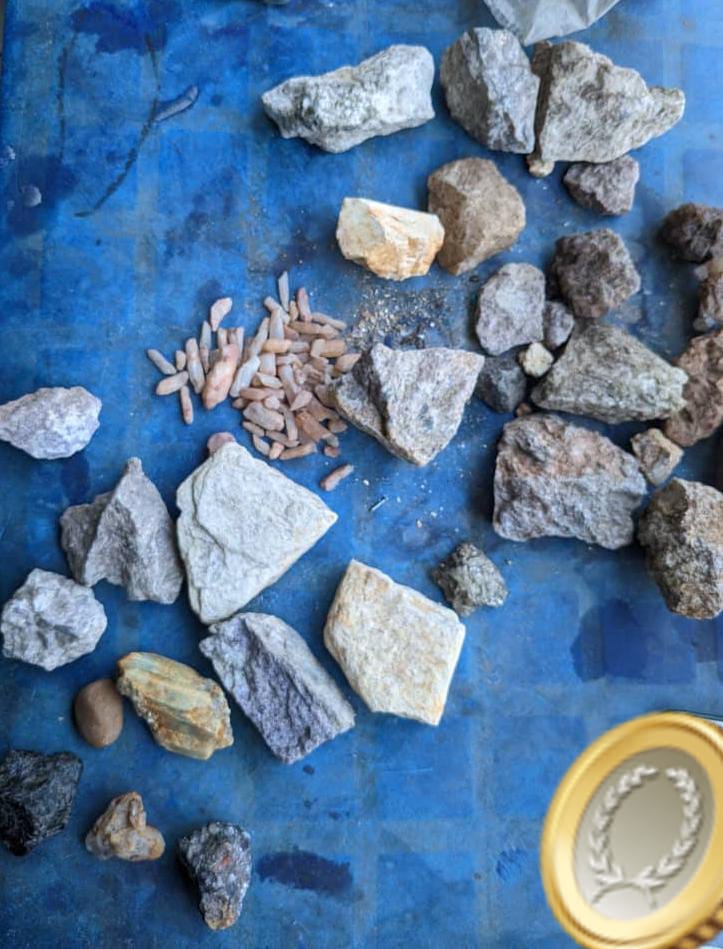
“Leaving it to a few individuals has caused an influx of foreigners who mine from our soil illegally.
“Nigeria has precious stones ranging from Beryllium, Lithium, Lepidolite, Guyana, Tourmaline, Pebble quartz, Topaz, Rose quartz, Aqua, Crystal quartz, etc.”
READ ALSO: REPORTER’S DIARY: Despite Ban on Illegal Taxes, Agberos Still Harass Lagos Drivers
STRABARG PRECIOUS STONE MARKET
With Chief Adamansigba’s blessing, we went into Strabarg precious stones market which was just behind where he had displayed the Rose Quartz. At the market, we met Hausa-speaking Alhaji Rasaq, Alhaji Sherif, and Alhaji Daodu, who were sorting good green and red tourmaline from the bad ones.
Alhaji Rasaq noted our confusion over the stones and said, “Both stones are tourmaline. The colors are only different because tourmaline has many colors ranging up to 70.”
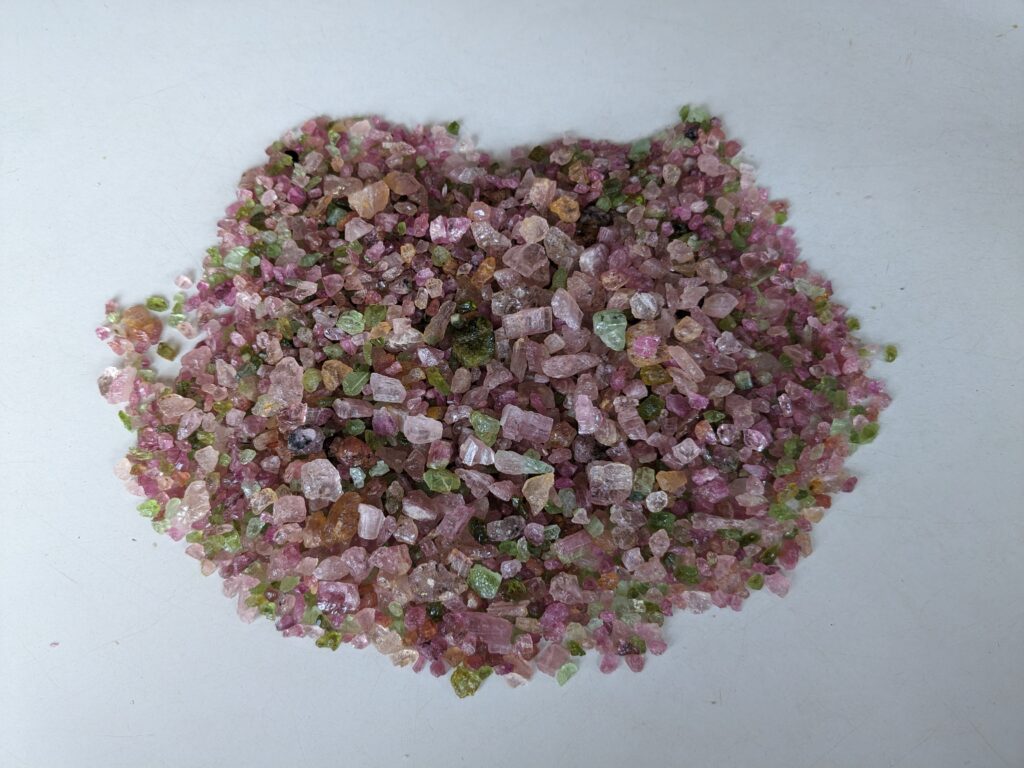
He said the stones are mostly sold in kilograms, but only to those who can afford them because of the rigorous process the stones pass through after they are mined.
After turning several curves, we saw tourmaline on display. We found out they were owned by one Engineer Gboyega.
“These are complicated stones, i.e., combustion stones, which means they are not clean,” he said, pointing to the stones laid on woven mats. “Stones are available everywhere based on how much you are willing to pay, because Nigeria has abundant precious stones. These tourmalines are from Nasarawa.”
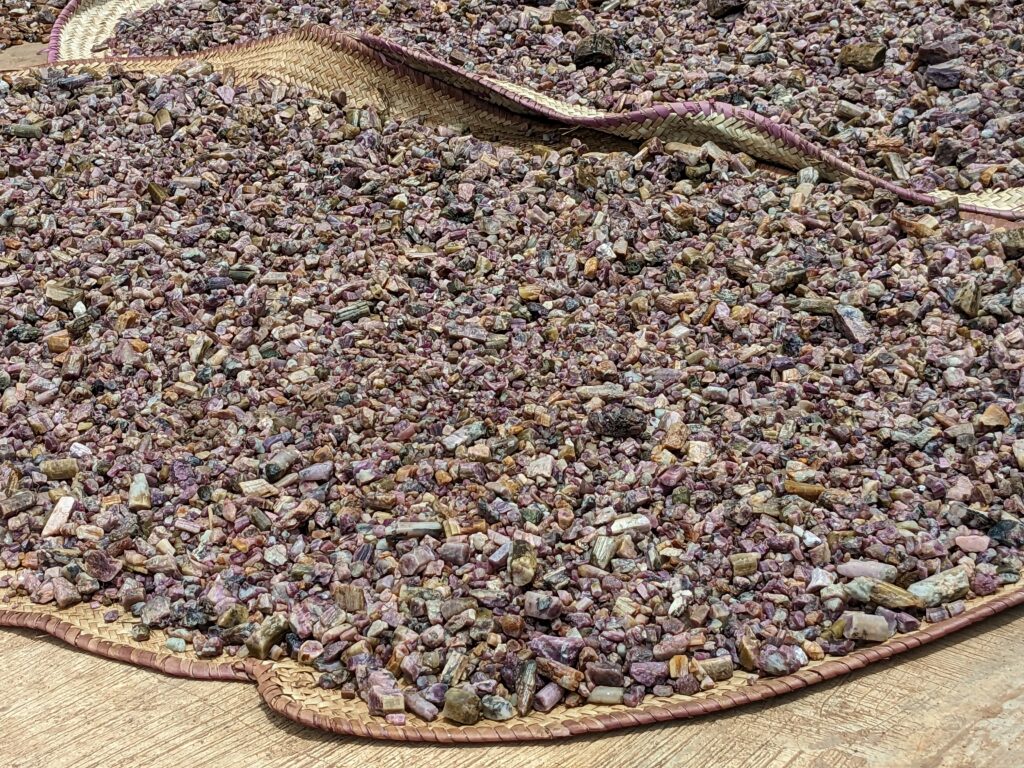
“You can’t just go to the market to say you want to buy stones. You have to know about it because mining is not open knowledge.”
My questions on the legality of mining the stones were deflected.
Precious stones are hard to find, I now know, and so is the market where they are traded.
Subscribe
Be the first to receive special investigative reports and features in your inbox.


